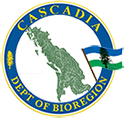Cascadia, the Name
Cascadia — the evocative name of a region, an idea, a movement — wild and free, defined by the waters flowing from the continental crest through the headwaters of the Pacific.
But what and where exactly did the name Cascadia arise from?
The term “Cascades” was first used for the Cascades Rapids, as early as the Astor Expedition. The first written reference originally stems from Scottish botanist David Douglas (for whom the Douglas Fir is also named) who explored the Columbia River Gorge in 1825. He wrote of the area’s ‘cascading waterfalls’, and it is through these that we hear the first mention of ‘the Cascades’ — from which the mountain range is now called.
The name ‘Cascadia’ itself wasn’t heard until much later, until it was first used by the town Cascadia, Oregon that was settled in 1890 in what is now Linn County. In a more recent context — “Cascadia” was first applied to the whole geologic region by Bates McKee in his 1972 geology textbook Cascadia; the geologic evolution of the Pacific Northwest. Later the name was adopted by David McCloskey, a Seattle University sociology professor, to describe it as a bioregion. McCloskey describes Cascadia as “a land of falling waters.”
According to McCloskey, this “initial” Cascadia included parts of seven jurisdictions (Northern California, Oregon, Washington, Idaho, Western Montana, British Columbia, and Southeast Alaska), running from the northernmost reaches of Southeast Alaska in the north to Cape Mendocino, California in the south–and covering all the land and “falling waters” from the continental divide at the Rocky Mountains to the Pacific Ocean. McCloskey, founder of the Cascadia Institute and co‐chair of Seattle University’s New Ecological Studies Program, saw Cascadian identity as something which transcends political or geographic definitions; it is more a cultural, ideological identity.
But Cascadia is more than simply a bioregion, or lines drawn on a map. He notes the blending of the natural integrity and the sociocultural unity that gives Cascadia its definition.This new notion of Cascadia, was heavily influenced by the bioregionalism movement of the 1970’s, inspired by Peter Berg and the Drum Foundation., seminal works like Joel Garraeu’s Nine Nations of North America, and Ernest Callenbachs novel Ecotopia, which portrayed an independent eco-state of the Northwest.
Today, the land of the watersheds of the Columbia, Fraser in traditional Chinook and Chinuk Wawa is known as Cascadia Illahee.
Illahee, illahie, illi’i – Land, country, earth, soil – in both physical and political senses; the apostrophe in the last spelling denotes a glottal stop, as may also the ‘h’ in the other spellings. The Chinook word for ‘homeland’ defined through the connection of people rather than geography – a network of peoples arranged through the interweaving of family, blood marriages, allies.
Cascadia Illahee – the Cascadia region, or the land of the Cascadia people (watersheds of the Columbia, Fraser and Snake). Home. Family.
The term Illahee comes from the Chinook world that comprised a network of kin-based villages, and a complex and vast trading network throughout the Cascadia bioregion and North America. This understanding of homeland, as expressed by Illahee was not, like European definitions, predicated on a physical location, boundaries or finite amount of space, but instead was centered around family, friends and allies, and the networks of interrelation that grew from these.
Chinook Jargon was the defacto language of the Cascadia Bioregion pre-European settlement, and as a trade language it incorporated different words and cultures as they moved into the region, including Chinese, French, English and Spanish. By the late 1800’s, more than 100,000 people spoke this regional language, and was often the first second language of immigrants who moved to the area.
We choose Cascadia Illahee to represent our land and movement in recognition that a place is more than simply lines on a map or a physical bioregion – but rather where the heart is, and the people who make it up. Our Cascadia Illahee means every person who identifies as a citizen of this place and watershed, the values and principles of what that means, and is committed to becoming an ambassador for this idea and movement. Cascadia means family. We hope you join us.

